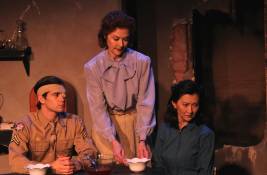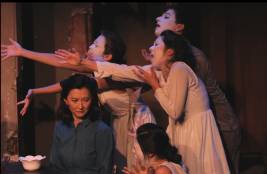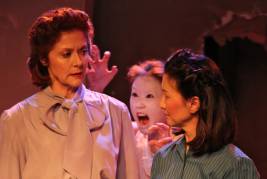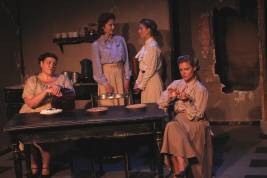
When returning WWII G.I. Alvin Rhodes told his mother Catherine he’d be bringing a surprise back to Merced with him, she thought he meant a lovely tea set. About the last thing she was expecting was a Japanese bride. After all, it was only the month before that the “Japs” had surrendered, and as far as Catherine was concerned, they were still our enemy. How dare Alvin play this sick joke on her? How dare he commit treason in this way!
Thus begins Samantha Macher’s highly original and often quite gripping War Bride, now getting its World Premiere production by SkyPilot Theatre, astutely directed and imaginatively choreographed by Nancy Dobbs Owen.
 Complicating matters is Yumi’s inability to speak even a word of English, and worse still is her sullen, even hostile attitude. Still, having raised Alvin pretty much by herself following the fortuitous departure of an abusive spouse, Catherine grudgingly agrees to let Alvin and Yumi stay with her and even begins to make efforts to communicate, thanks to a Japanese-English dictionary lent to her by longtime friend Richard.
Complicating matters is Yumi’s inability to speak even a word of English, and worse still is her sullen, even hostile attitude. Still, having raised Alvin pretty much by herself following the fortuitous departure of an abusive spouse, Catherine grudgingly agrees to let Alvin and Yumi stay with her and even begins to make efforts to communicate, thanks to a Japanese-English dictionary lent to her by longtime friend Richard.
Now you are probably thinking as follows: Yumi will do her darnedest to pick up English, and then, slowly but surely, begin to open up to Catherine. The two women will learn and grow from this cross-cultural experience, and in the process warm both Alvin’s heart and our own, putting a smile on our faces and maybe even a few tears in our eyes, right?
Think again. What playwright Macher has up her sleeve is something quite different, and though I’m dying to give you a hint of what’s in store one the playwright reveals her true intentions, to use even a descriptive adjective would give too much away and spoil War Bride’s greatest reward, the way it ever so slyly upends our expectations in its dramatic second act.
 Not only has Macher set her play in a historical past, her characters all speak a 1940s lingo, and director Owen has them adopt a pre-method style of acting, more than a tad artificial to contemporary ears and sensibilities but entirely appropriate to Macher’s vision, one which also includes a bit of Japanese surrealism in its use of a quartet of “ghosts” to express Yumi’s emotions in Butoh-style movement and dance.
Not only has Macher set her play in a historical past, her characters all speak a 1940s lingo, and director Owen has them adopt a pre-method style of acting, more than a tad artificial to contemporary ears and sensibilities but entirely appropriate to Macher’s vision, one which also includes a bit of Japanese surrealism in its use of a quartet of “ghosts” to express Yumi’s emotions in Butoh-style movement and dance.
Though some audience members might wish that Macher and Owen had used projections to translate Yumi’s words, the duo’s intentions in not doing so are clear. We are to be as perplexed by Yumi’s inscrutability as her characters are. Take for instance the Japanese woman’s hostile reaction when a well-meaning local attempts to beg Yumi’s pardon by looking up the word “apologize” in Catherine’s dictionary. A Japanese speaker would understand Yumi’s outrage at what she’s told. We, like the characters onstage, do not, and Macher’s play is more effective for putting us in the American characters’ shoes.
 War Bride’s acting troupe have clearly done their ‘40s pre-Brando homework, a stagier style than they’re doubtless accustomed to, but one entirely befitting dialog that often sounds more like written English than spoken. I do think that Macher goes a bit overboard in eliminating virtually every contraction, e.g. “do not” for “don’t,” but in other ways her ‘40s vernacular seems spot-on.
War Bride’s acting troupe have clearly done their ‘40s pre-Brando homework, a stagier style than they’re doubtless accustomed to, but one entirely befitting dialog that often sounds more like written English than spoken. I do think that Macher goes a bit overboard in eliminating virtually every contraction, e.g. “do not” for “don’t,” but in other ways her ‘40s vernacular seems spot-on.
An excellent Julia Sanford anchors the production as Catherine, the play’s biggest and toughest role, one which requires her to go from angry, disappointed mother to secret investigative reporter, with even a bit of courting on the side from an ever so amiable Jeffrey Markle as salt-of-the-earth Richard. A terrific Brett Fleisher plays homecoming king turned soldier turned returning vet Alvin with just enough edge to make us sit up and pay notice. Sachiyo K makes a particularly strong impression as a war bride for whom the war appears not to have ended at all.
 A marvelously spunky Amelia Rose plays Alvin’s high school sweetheart Evelyn Pritchett, whose peppy exterior masks the fears of a young woman whose soldier hubby might never be coming home, despite her daily waits at the local train station. Kelly Goodman, as Evelyn’s gossipy mom Lucille, and Katie Apicella as her like-mother-like-daughter sister Nellie provide zingy support.
A marvelously spunky Amelia Rose plays Alvin’s high school sweetheart Evelyn Pritchett, whose peppy exterior masks the fears of a young woman whose soldier hubby might never be coming home, despite her daily waits at the local train station. Kelly Goodman, as Evelyn’s gossipy mom Lucille, and Katie Apicella as her like-mother-like-daughter sister Nellie provide zingy support.
Then there are the four ghosts (Alicia Foo, Reesa Ishiyama, Yukari Koseki, and Ethan Zachery Scott), whose white-painted faces, stylized moves (courtesy of Owen in choreographic mode), and horror-struck gazes give us a glimpse into Yumi’s enigmatic, tortured soul.
War Bride benefits from a first-rate design package. Scenic designer Zachary B Guiller has given the Rhodes home a bombed-out look, as if viewed through the eyes of a bride who has seen war at its most horrific. Matt Richter’s sound design adds to the dramatic tension and suspense as does Wes Chew’s vivid lighting. Costume designer Kareem Cervantes gets his highest marks for production’s ghostwear. The women’s outfits have more of a late-‘40s than mid-decade look to them (skirts were still knee-length in 1945) and it would be nice for Catherine to have a change of clothes for the second act. Additional credits go to Michelle Ingram (graphic design), Cole Baldwin (set dressing), and Sachi K and Rebecca Quirk (dramaturgy). Jude Evans is assistant stage manager. War Bride is assistant directed and stage managed by Heidi Marie Hosteler.
Multiple scene changes, each of which plunges the audience into near darkness, tend to last longer than would be optimal, and the skeptic in me wonders if a non-Japanese-speaking American could even decipher handwritten Japanese characters with the aid of a pocket dictionary, let alone put them together into comprehensible English sentences given how mirror-opposite Japanese sentence structure is to English word order. But these are minor quibbles.
War Bride takes us to a place and time we don’t see depicted all that often on the stage and tells its story with imagination and flair, ultimately recounting a quite different tale from the one we initially assume it will be. One thing is certain. Samantha Macher’s historical drama with a twist is sure to get you talking once the lights have come back up following its stunning climax.
T.U. Studios, 10943 Camarillo St., North Hollywood.
www.SKYPILOTTHEARE.com
–Steven Stanley
August 19, 2012
Photos: Heidi Marie Photography


 Since 2007, Steven Stanley's StageSceneLA.com has spotlighted the best in Southern California theater via reviews, interviews, and its annual StageSceneLA Scenies.
Since 2007, Steven Stanley's StageSceneLA.com has spotlighted the best in Southern California theater via reviews, interviews, and its annual StageSceneLA Scenies.







 COPYRIGHT 2025 STEVEN STANLEY :: DESIGN BY
COPYRIGHT 2025 STEVEN STANLEY :: DESIGN BY